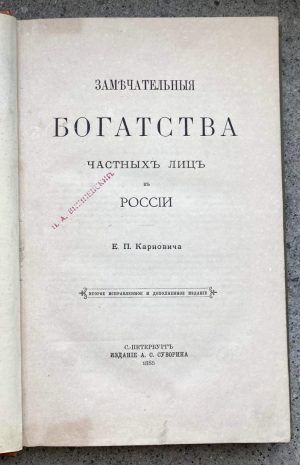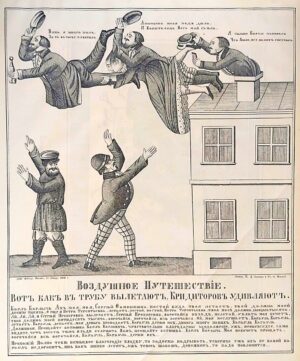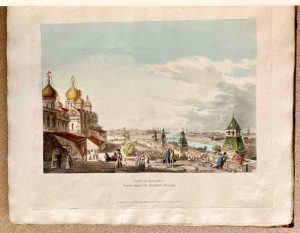Our Notes & References
First edition of Gogol’s landmark masterpiece: with the very rare printed upper wrapper.
“One of the great novels of nineteenth-century Russia” (Fekula) by “19th-century Russia’s greatest comic writer [and] one of the supreme masters of Russian prose” (Terras).
Of Ukrainian birth and Russian expression, Nikolai Gogol (1809-52) began writing his “paradoxical epic” in 1836 at the encouragement of his friend, then already Russia’s main poet Aleksand Pushkin who quickly “recognized [in Gogol] a unique and exceptional phenomenon” (Terras). Most of the next six years Gogol spent in Italy where he created his quintessential image of Russia in its diversity and contradictions. “The novel, in other words, is an artistic document that sought to include, alongside comic and lyric delight, “all of Russia”—Russian types, manners, speech—presented as a statement about Russia’s current spiritual state, and about its ultimate destiny” (Terras).
“Perhaps never had Gogol put so much worldly experience, heartfelt endearments and feigned anger into his work as he did in 1842 when he began publishing Dead Souls,” the critic Pavel Annenkov later recalled. The novel’s first censor in Moscow was afraid to give his permission for printing; Gogol then sent the manuscript to St. Petersburg through the influential critic Vissarion Belinskii, having asked for help Prince Vladimir Odoevskii, poet Petr Viazemskii, and his good friend, a maid of honour to the Imperial court, Aleksandra Smirnova-Rosset. Finally, Gogol rewrote some of the sensitive parts and allowed to change the title from “Dead Souls” to “The Adventures of Chichikov, or Dead Souls”, thus shifting the emphasis from political satire to a picaresque novel.
The “poem” was finally published in 1842 in 2400 copies; and Gogol’s status of a contemporary classic became firmly established in Russian society: “with almost unanimous enthusiasm […] he was now read by everyone, from Nicholas I to ordinary people and literary critics of all political views” (Babitskaia). Terras notes that Dead Souls galvanised “the powerful energies of 19th-century Russian fiction itself”. The young Fedor Dostoevsky knew the novel by heart; in his Diary of a Writer he describes how he went “to see one of his old friends; we talked about Dead Souls all night long and read it I don’t even remember how many times” (quote from Babitskaia).
The next ten years of Gogol’s life (1842-52) would centre around his vain struggles to complete the next two parts, as a parallel to Dante’s Divine Comedy, but he deemed none of what he wrote worthy of publication. Shortly before his death, Gogol burned the second volume of his poem; its accidental surviving pieces and the writer’s draft were later recomposed by the heirs and published in 1855 as an unfinished, posthumous second part; a third volume was never written.
Bibliography
Victor Terras, Handbook of Russian Literature, New Haven, Yale University Press, 1991, pp. 175-176.
Varvara Babitskaia, “Mertvye dushi, Nikolai Gogol” // Polka academy, 2018.
Fekula 4716; Kilgour 345; Smirnov-Sokolskii, Moia biblioteka, 610.
Physical Description
Large 8vo (25 x 17 cm). 475 pp. incl. half-title and title.
Binding
Original illustrated upper wrapper bound in near-contemporary black half-sheep over brown marbled boards, flat spine with direct lettering in gilt, date at foot, dark grey floral endpapers, top edge red.
Condition
Wrapper a bit stained and tightly bound in gutter, no lower wrapper; small spotting, foxing or staining throughout, mostly marginal, first lower fly-leaf with handwritten table of contents in Russian (such a leaf was never printed so it is not missing), small illegible ink stamp to last lower fly-leaf.

![Image for GOGOL. Mertvie dushi [Dead Souls]. First edition. Moscow, 1842 #2](https://www.pyrarebooks.com/wp-content/uploads/2023/12/2250_1-scaled.jpg)
![Image for GOGOL. Mertvie dushi [Dead Souls]. First edition. Moscow, 1842 #3](https://www.pyrarebooks.com/wp-content/uploads/2023/12/2250_2-scaled.jpg)
![Image for GOGOL. Mertvie dushi [Dead Souls]. First edition. Moscow, 1842 #4](https://www.pyrarebooks.com/wp-content/uploads/2023/12/2250_3.jpg)
![Image for GOGOL. Mertvie dushi [Dead Souls]. First edition. Moscow, 1842 #5](https://www.pyrarebooks.com/wp-content/uploads/2023/12/2250_4.jpg)
![Image for GOGOL. Mertvie dushi [Dead Souls]. First edition. Moscow, 1842 #6](https://www.pyrarebooks.com/wp-content/uploads/2023/12/2250_5.jpg)
![Image for GOGOL. Mertvie dushi [Dead Souls]. First edition. Moscow, 1842 #7](https://www.pyrarebooks.com/wp-content/uploads/2023/12/2250_6.jpg)
![Image for GOGOL. Mertvie dushi [Dead Souls]. First edition. Moscow, 1842 #8](https://www.pyrarebooks.com/wp-content/uploads/2023/12/2250_7.jpg)
![Image for GOGOL. Mertvie dushi [Dead Souls]. First edition. Moscow, 1842 #2](https://www.pyrarebooks.com/wp-content/uploads/2023/12/2250_1-300x469.jpg)
![Image for GOGOL. Mertvie dushi [Dead Souls]. First edition. Moscow, 1842 #3](https://www.pyrarebooks.com/wp-content/uploads/2023/12/2250_2-300x446.jpg)
![Image for GOGOL. Mertvie dushi [Dead Souls]. First edition. Moscow, 1842 #4](https://www.pyrarebooks.com/wp-content/uploads/2023/12/2250_3-300x372.jpg)
![Image for GOGOL. Mertvie dushi [Dead Souls]. First edition. Moscow, 1842 #5](https://www.pyrarebooks.com/wp-content/uploads/2023/12/2250_4-300x384.jpg)
![Image for GOGOL. Mertvie dushi [Dead Souls]. First edition. Moscow, 1842 #6](https://www.pyrarebooks.com/wp-content/uploads/2023/12/2250_5-300x393.jpg)
![Image for GOGOL. Mertvie dushi [Dead Souls]. First edition. Moscow, 1842 #7](https://www.pyrarebooks.com/wp-content/uploads/2023/12/2250_6-300x405.jpg)
![Image for GOGOL. Mertvie dushi [Dead Souls]. First edition. Moscow, 1842 #8](https://www.pyrarebooks.com/wp-content/uploads/2023/12/2250_7-300x379.jpg)



